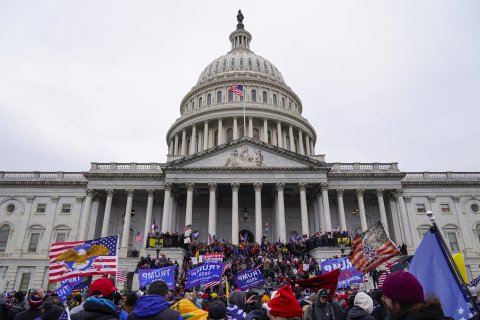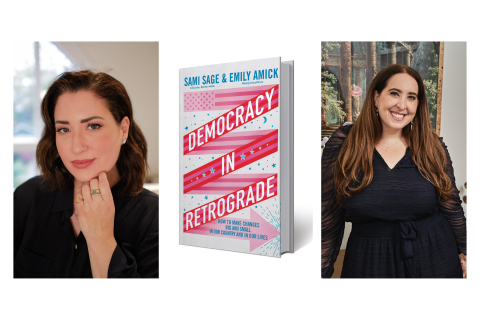Feeling Exhausted by US Politics? You’re in the Majority, Authors Say
Politics tamfitronics
Are Americans really as polarized as it seems? Authors Sami Sage of Betches Media and the Morning Announcements podcast and Emily Amick, creator of @EmilyinYourPhone and former counsel to Senate Majority Leader Chuck Schumersay not exactly. They connected on social media after the January 6 attack on the Capitol, and their collaboration resulted in their new book, Democracy in Retrograde (Gallery Books). Sage and Amick found that most Americans are part of the (very vocal) minority on the margins, but are rather an “exhausted majority,” who have opted out of politics. Their solution? Civic engagement. Here, the authors discuss easy ways to get into political participation, why it’s important, whether they think Donald Trump‘s recent conviction will spark more engagement or encourage voter apathy, whether we should be hopeless about democracy and more.

Q _ When did the two of you meet and how did your collaboration come about?
A _ We connected over Instagram DM on January 9, 2021, to talk about the insurrection. The rest is history.
What about political participation excites you? Why do you feel it’s important?
Politics shapes our lives, whether we show up or not, and whether or not we’re consciously aware of it. To witness and personally impact the process in a way that tangibly changes people’s quality of life is both personally gratifying and necessary. It’s also an incredible way to make friends and build a community that shares your values.

What’s an easy way to start getting involved?
Pick one issue you feel most passionate about, and then pick a few individuals to follow on social media (journalists, creators, activists, organizations, advocates, elected officials, influencers) who are also focused on that issue. Turn on notifications for their accounts and pay attention to the information and action items they recommend. Save your representatives’ phone numbers in your phone and call them whenever something relevant to your issue of choice comes up.
How has the Dobbs decision overturning Roe v. Wade affected women’s engagement in civic life?
A lot of people who felt a false sense of security around access to our reproductive rights have realized that those rights are no longer a given. We’ve seen how much the overturning of Roe—as well as subsequent rulings on IVF and medication abortion—has deeply galvanized voters across the country, especially in historically Republican-controlled states. It also awakened people up to the sophistication of the Republican efforts to turn back the clock on our rights, as this was the result of a 50-year plan that involved developing a pipeline of far-right judges, stacking the courts, developing impact litigation firms, writing model legislation to test arguments to undermine Roe and more.

In 2016, we seemed poised to have a female president, but there’s been no major-party female nominee since. Is women’s participation in politics impacted by female candidates? Or vice versa?
Yes, and this doesn’t just go for women, but this speaks to why it’s so important that our elected representatives actually represent us. It’s necessary that lawmakers with the power to affect our lives intimately understand the needs and desires of their constituents, and even more important that policy decisions are made by those most affected by them.
The reaction to Trump’s recent criminal conviction starkly highlights divisions between the American left and right. Will the likely inclusion of a convicted felon on the November ballot cause more apathy among the electorate, or will it spur voters to action?
One of the things we think is lost in the frenetic media coverage of national politics is that the vast majority of Americans are not polarized on one of the extremes. Most Americans are living their lives, and they care about their lived experiences. They want to have politicians that keep the proverbial trains running on time and make their lives better. Most people don’t want constant volatility and unrepentant felons for president, they want an even hand steering the ship.
This November, there isn’t just the presidency on the ballot, and we have actually seen that popular candidates in state and local elections are ones that bring new constituencies to the polls. Amanda Litman at Run for Something has argued that “reverse coattails” will be the story of this cycle, as we hear people becoming increasingly engaged around local candidates. Those voters will turn out for the downballot race. At the end of the day, politics is personal, and apathy is a political statement, too. Choosing apathy means handing over your power to people who may not care about your life, your family or your community, and who may actually be working for policies that will degrade your quality of life and safety.
Should we be hopeless about the state of our democracy?
No, there have been other precarious moments throughout our history. The future isn’t predetermined and we aren’t necessarily doomed, unless we collectively allow ourselves to be.
What was the most surprising thing you learned when researching this book?
That the most effective way to change minds on political issues is by speaking to your own friends and loved ones. It’s not the pundits or the TV ads or the barrage of fundraising texts, but the casual conversations had in seemingly mundane moments that can drive the future of our democracy.
About the writer
To read how Newsweek uses AI as a newsroom tool, Click here.
Discover more from Tamfis
Subscribe to get the latest posts sent to your email.

